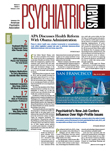The proportion of Americans under age 65 reporting problems affording prescription medications is on the rise after remaining steady in the early part of this decade—from 10.3 percent in 2003 to 13.9 percent in 2007, according to survey findings released last month.
The survey was conducted by the Center for Studying Health System Change (HSC), a nonpartisan health policy research organization in Washington, D.C.
About 36.1 million working-age adults and children went without prescription drugs in 2007 because of cost concerns—about 11.7 million more people than in 2003, according to the survey report.
The report cited a number of reasons for the downturn: higher prescribing rates, drug prices that are rising at a rate faster than that of workers' incomes, higher copays in private insurance, and availability of costly new drugs.
The report findings were based on responses to a telephone survey of a nationally representative sample of 10,400 working-age adults (ages 19 to 64) and included 2,600 children. Respondents were asked, “During the past 12 months, was there any time you needed prescription medicines but didn't get them because you couldn't afford it?”
“The outlook for nonelderly Americans' access to prescription drugs is not positive,” wrote report authors Laurie Felland, M.S., and James Reschovsky, Ph.D., both HSC senior health researchers. “The ability of many people to afford prescription drugs is likely to deteriorate as the economy continues to decline. The economic downturn will swell the ranks of the uninsured and place greater fiscal strains on state Medicaid budgets, likely leading to tightening of drug benefits and eligibility.”
The trend is particularly vexing with regard to children. “Because children typically are in better health and require fewer medications than adults, they have fewer prescription drug access problems. Nevertheless, unmet prescription drug needs between 2003 and 2007 grew even faster among children, from 3.1 percent to 5 percent—affecting 3.9 million children in 2007.”
Not surprisingly, the largest growth in unmet prescription needs was among people with low incomes, chronic conditions, and no insurance. Uninsured, working-age people who were unable to afford prescription drugs saw the biggest jump—from 26 percent in 2003 to nearly 35 percent in 2007.
Nonelderly respondents with employer-provided health insurance were less impacted but nonetheless also saw reduced access due to cost. The survey found that nearly 11 percent went without a prescription medication in 2007, which was an increase from about 9 percent in 2003.
“The rising proportion of Americans who cannot afford prescription drugs is particularly troublesome because medications are increasingly important in treating many medical conditions, particularly chronic conditions,” concluded the authors.
“More Nonelderly Americans Face Problems Affording Prescription Drugs” is posted at<www.hschange.org/CONTENT/1039/>.▪
